Ubisoft is one of the most easily recognizable video game companies in the world. Ubisoft is responsible for providing gamers with hits like the Far Cry series and Watch Dogs, so it is arguable that Ubisoft’s crown jewel is the Assassin’s Creed franchise. Assassin’s Creed has come a long way from its first release in 2007. 13 years and 20+ more games later it is almost essential that the games be compiled and summarized in chronological order.
The Assassin’s Creed video games can be divided into the main series and the spin offs. The main series feature games that are considered “canon” to the storyline whereas the spin-offs offer non-cannon adventures. Each game has had varying degrees of success, with the spin-offs in particular not doing as well as Ubisoft would have hoped. But let’s not waste any more time and get right into it.
Posts you may also like:
Assassin’s Creed
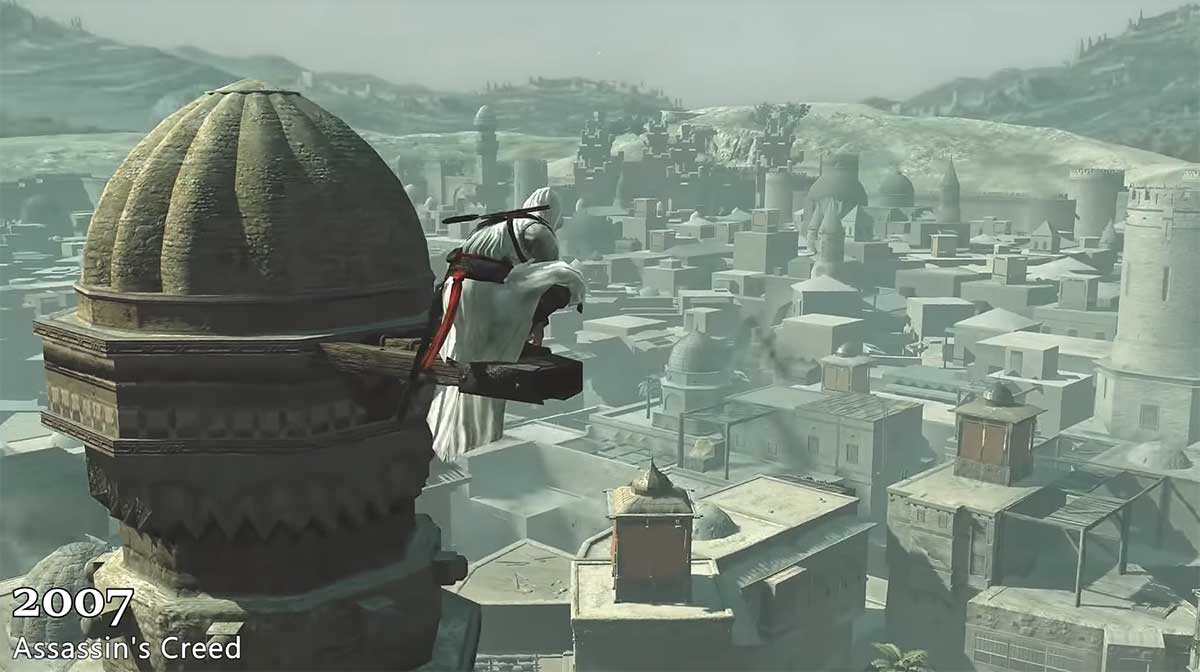
The original Assassin’s Creed was released on 13th November 2007. The game was available on the Xbox 360, PS3 and Microsoft Windows with Nintendo completely missing out on the game. The first game had gamers fawning over the incredibly unique story, the concept of playing out levels in the form of genetic memories, which transported players into the role of Altair a member of a brotherhood of assassins. The game is set in the Middle East, during the era of the crusades. The game may look rather aged and clunky now but when it was released the game looked and played quite brilliantly. For the first few hours, many gamers would have been convinced that the game is absolutely fantastic but as the game progresses its quest and combat become incredibly repetitive. Yet this doesn’t take away much from the brilliant story, the game may not have been perfect, but it set the stage for next games whilst introducing several components that are now infamous with the Assassin’s Creed franchise.
Assassin’s Creed II
The second installment of the Assassin’s Creed series was released on 17th November 2009. The game was available on the Xbox 360, PS3 and PC initially with remastered versions being released for the next generation consoles. The sequel immediately continues with where the events from the modern-day aspect of the previous game ended, however the historical part of the game is set in Renaissance-era Italy.
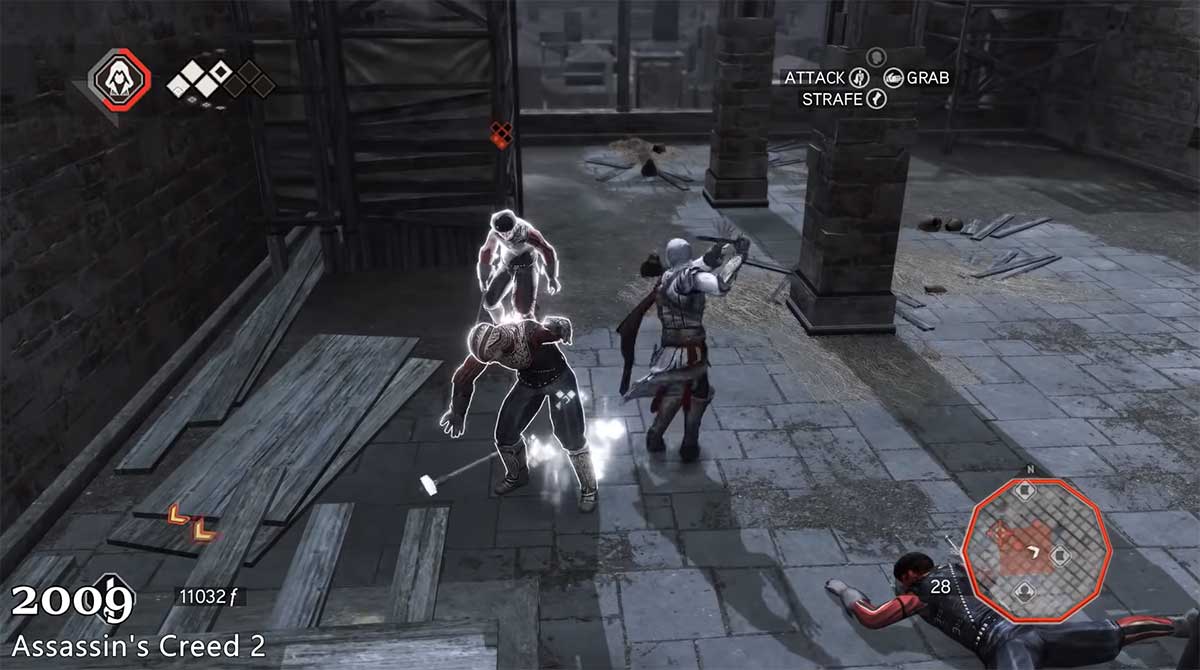
Responsible for introducing perhaps the most popular protagonist in the series Ezio auditore, the game also featured one of the most beautifully designed open worlds, unlike the first installment of the brilliant visuals and story are fully backed up by the gameplay. Further improvements were made to the combat and free running aspects which helped make the game much more enjoyable until the very end. The first game may have been responsible for setting up the franchise and drawing inattention, it is the second installment of the series that truly put the franchise onto the map. The recently released remastered versions are slightly disappointing with several animations and character modeling redesign flaws that take away from this great game.
Assassin’s Creed: Brotherhood
Brotherhood further extends the story of Ezio Auditore, the game didn’t introduce many drastic changes the graphics were improved slightly whilst certain changes were added to combat that made the overall gameplay much more refined. In this edition of the game Ezio is tasked with restoring the brotherhood of assassin’s, this led to one of the game’s best features as now you could recruit people to your guild of assassin’s. The recruits could also be sent on timed missions that would contribute towards their level, the player could also call on these Assassin’s to eliminate any target at any given time which may not be the most realistic feature, but it was a lot of fun.
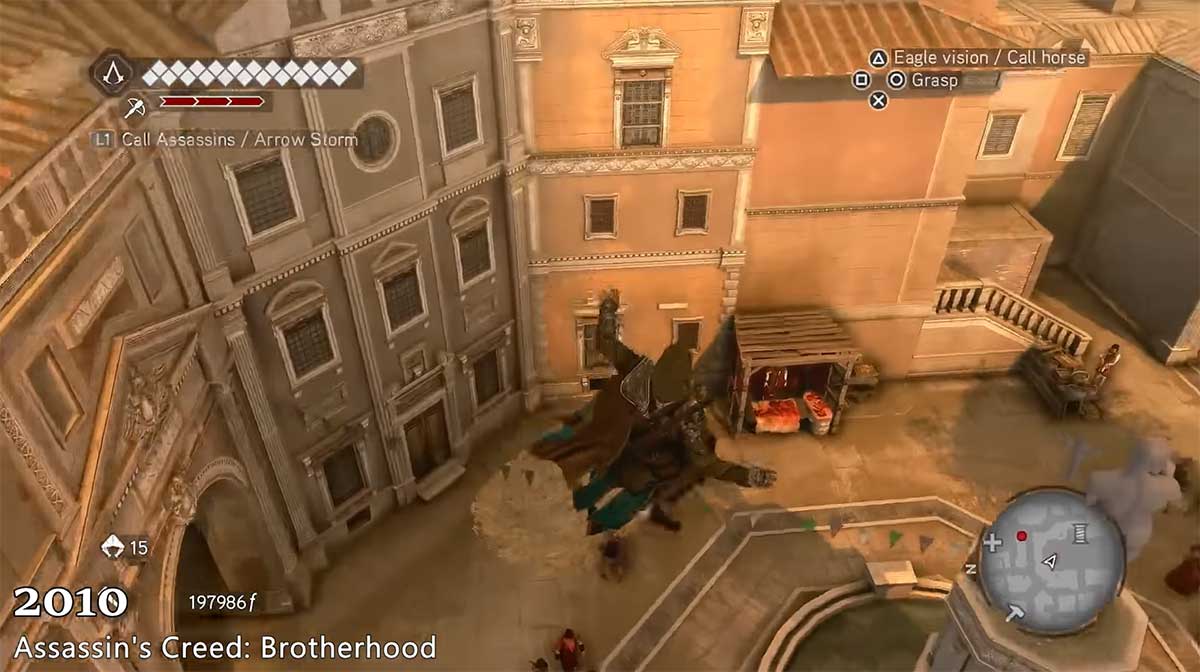
It is arguable that this is a spin-off due to the later release of Assassin’s Creed III but at the time of its release, the game felt much more cannon than a spin-off due to its role in the grand narrative Ubisoft had in mind for Ezio Auditore and the Assassin’s Creed. In addition to this, the game also introduced a competitive multiplayer mode which albeit not the most refined offered respite when the main game would start to feel stale.
Assassin’s Creed: Revelation
Initially released for the PlayStation 3, Xbox 360 and PC on the 15th of November 2011. The game was remastered and released alongside Assassin’s Creed II and Assassin’s Creed: Brotherhood in the Ezio Auditore Collection. Perhaps the only Assassin’s creed that isn’t for first-time players of the series, revelations represents the final chapter of the Ezio Auditore story. Unlike the previous two games, the setting jumps from renaissance era Italy to the Ottoman Empire. The game doesn’t feature any major gameplay changes, it is a merely another refinement of the series which is well established at this point. It is also at this point where complaints about the series stagnating first arose.
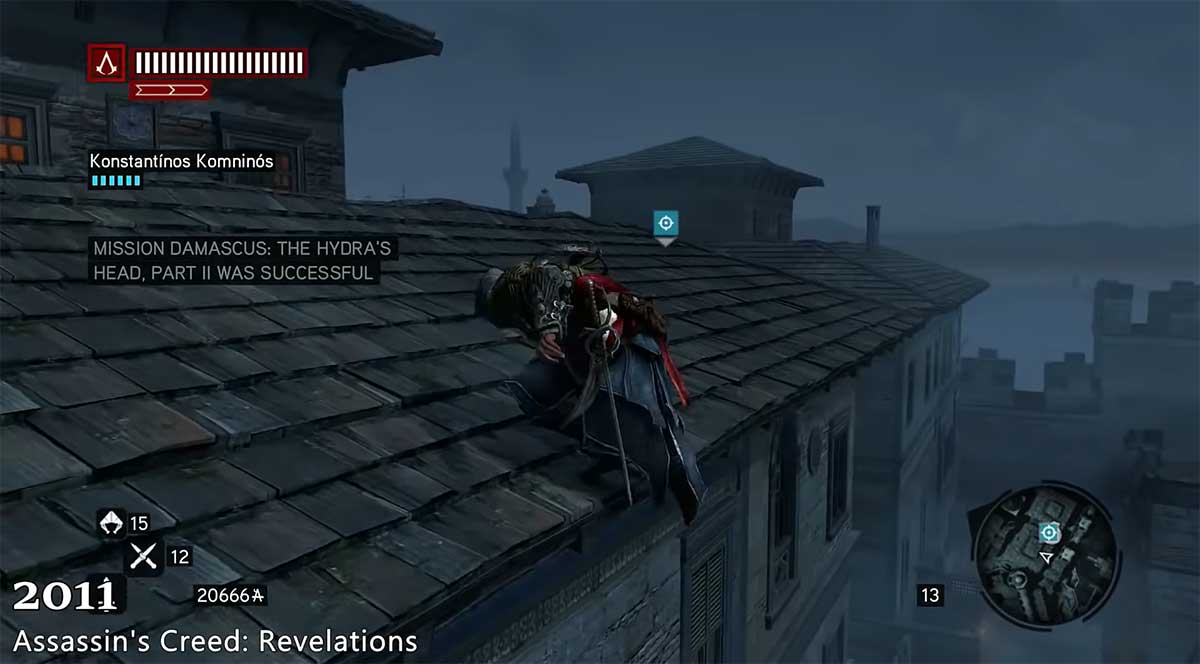
The most memorable feature introduced in the game was the “hook blade” which added another dimension to the already exceptional free running mechanics. Due to these aspects, this may be the only Assassin’s Creed that is solely for the hardcore fans of the series and it ends the story of Ezio Auditore quite beautifully.
Assassin’s Creed III
Technically the fifth release in the canon series, Assassin’s Creed III was released on October 30, 2012. This marks the first time the game was released on all traditional consoles; Wii U owners could now play the game as well as PlayStation 3 and Xbox 360 owners.
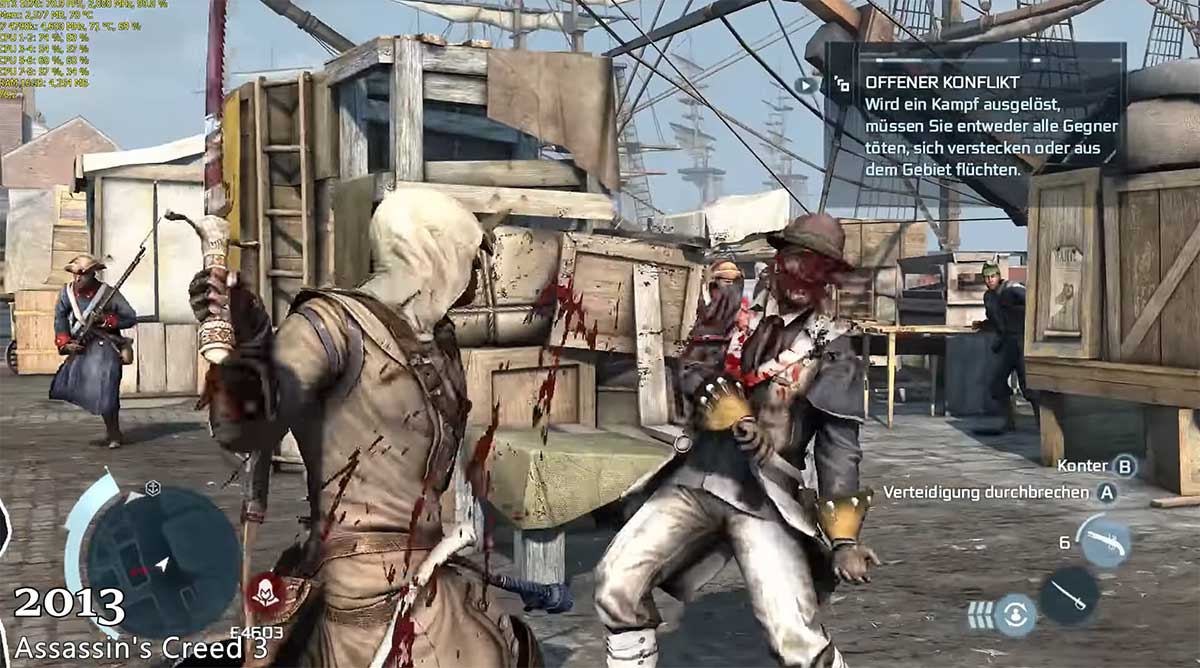
The new game took gamers to America during the times of the American Civil war, players were in control of a Native American assassin named Ratonhnhaketon who adopts the name of Connor to amalgamate amongst the Americans. Unlike the previous installments in the Assassin’s Creed series, the new installment in the series moved away from the tightly knit urban environments of the previous games and to the much more open wilderness of America at that point in time. Thus, the gameplay and mechanics were altered to suit the much vaster environments. Despite not enjoying the same amount of success as its predecessors, Assassin’s Creed III featured the series most well-developed open-world experience to date. The game also introduced naval combat although this was merely a side feature.
Assassin’s Creed IV: Black Flag
The game was released on 29th October 2013 and was available on all major platforms at that time. The game was also launched for the next generation of consoles as well marking the first time the series was released on the new generation of consoles. The graphical improvements that followed were breathtaking.
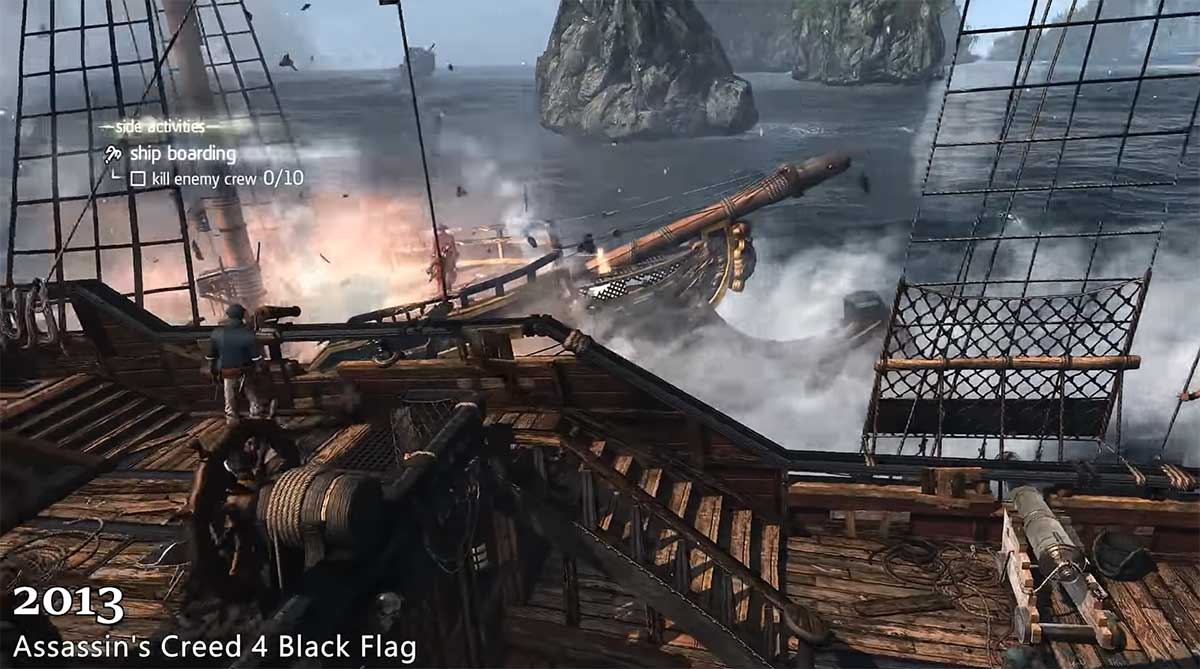
Set in the same timeline as its prequel Assassin’s Creed III, the events of this game take place before the American civil war. Players take on the role of the Edward Kenway who’s related to the main character from the previous game. Assassin’s Creed IV takes a much bigger step towards the revitalization of the Assassin’s Creed series. Essentially a game about Pirates, this game played differently to any other in the series. The game’s emphasis on naval combat and exploration provides the player with a much freer path to the end of the game.
Assassin’s Creed IV: Freedom Cry
What was initially DLC for Black Flag came out as a full video game later, Freedom Cry is an intriguing installment in the series. The DLC release was at the end of 2013. A year later, the game out as standalone title on the PC and PSN.
The story follows the life of Adewale. Adewale was Edward Kenway’s, first mate. When it comes to story Freedom Cry shines a lot more than Black Flag.
The story leans into very heavy themes and questions the true meaning of freedom. Players will be left contemplating what they experience. It’s quite refreshing after the lackluster narrative of Black Flag. However, while it may surpass the original in terms of story-telling, the gameplay is worse.
Freedom Cry completely ignores the innovations Black Flag made. Rather than take advantage of the freedom, the game goes towards more linearity. No longer can you get on a boat and explore all corners. Additionally, the game reintroduces some of the more annoying series mission tropes.
Instead of letting you explore and be creative, most of the quests require you to follow characters around. Ultimately, the gameplay holds back what is one of the most compelling stories in the franchise’s history.
Assassin’s Creed Rogue

After the brilliance of Assassin’s Creed IV, expectations from the Ubisoft series had reached a fever pitch once again. However, this installment of the series didn’t particularly set the world alight. The game was the first instance where instead of assuming the role of an Assassin the players get to play as a Templar instead of the traditional brotherhood of Assassin’s character. Furthermore, the game made the use of the incredibly popular naval exploration of the previous game, but no improvements were made. The setting was merely changed from the Atlantic Ocean to the Arctic.
Assassin’s Creed Unity
Released on the 11th of November 2014 and was released for the PlayStation 4, Xbox One and PC. Assassin’s Creed Unity saw the game go back to its early urban routes, the game was set in the beautiful city of Paris during the French Revolution. The player takes the role of Arno Dorian, who was a deadly assassin during the French Revolution. The game successfully introduced a much greater deal of character customization, allowing the player to unlock different attributes to suit their style of play. This sandbox approach to the game takes on greatly from RPG elements. This further elevates the gameplay of the game, the sandbox assassinations at the end of each sequence are incredibly rewarding and allow for several different approaches towards achieving your target.
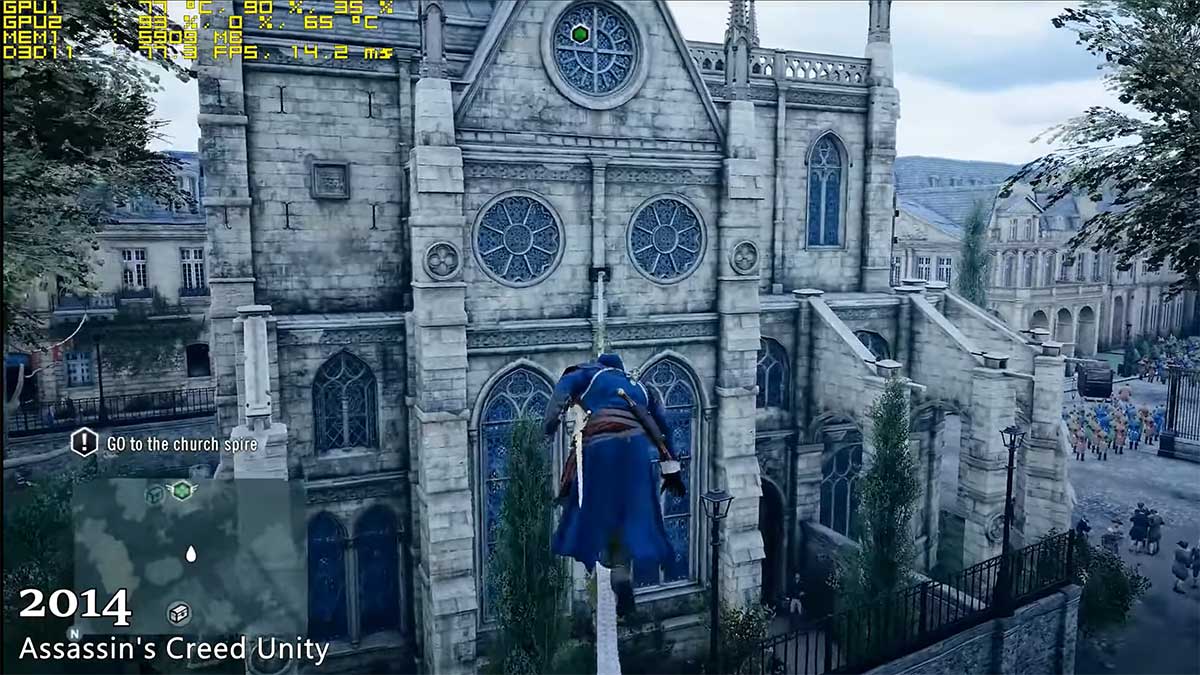
The game has several flaws as well though, notoriously buggy on its initial release the game had several players raging at Ubisoft and the game didn’t run smoothly until several patches later. The game was the first in the series to feature cooperative multiplayer, this was also mostly a novelty feature as it didn’t add anything different to the overall game. The game that was being billed as the savior of the series ultimately flattered to deceive due to the uninspiring protagonist and several glaring gameplay issues.
Assassin’s Creed Syndicate
After the dull reception to Arno, the protagonist involved in the last game Ubisoft decided to offer two protagonists in this release. Jacob and Evie, also known as the Fyre twins are tasked with freeing London from its oppressors, the Templars. The timeline jumps to Victorian Era London, and the city is stunningly recreated in the game. The game has an almost bloodborne like a charm in its dark setting. The streets of London are incredibly atmospheric, and the twin protagonists are also a welcome upgrade from the rather dull Arno.
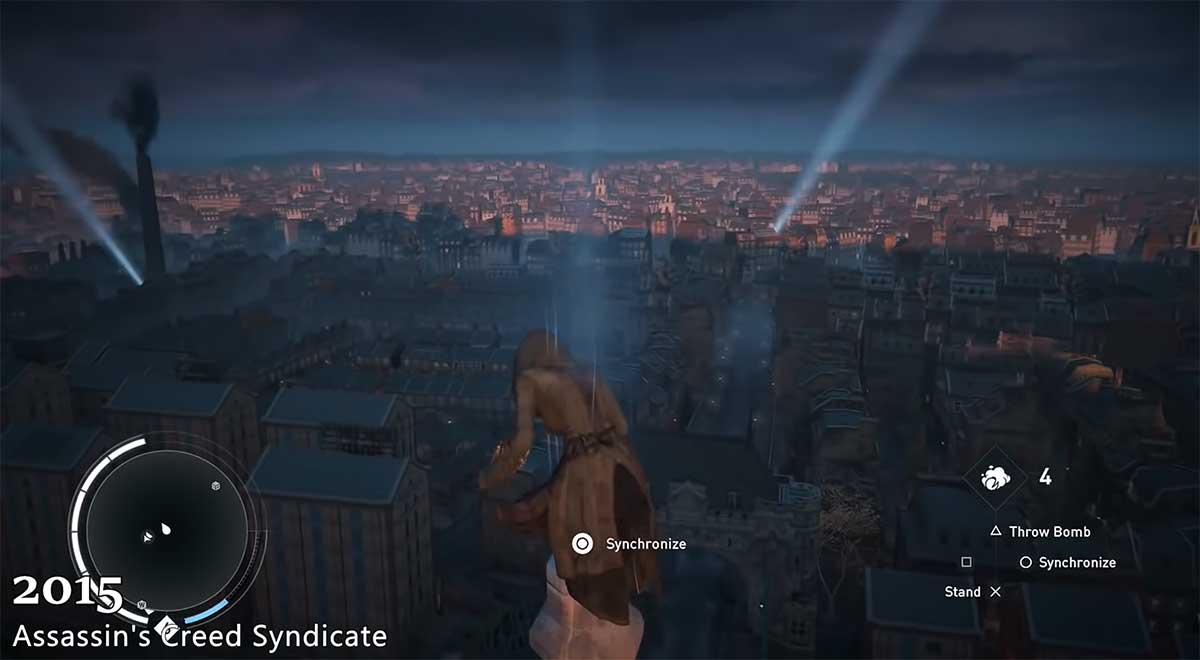
The game was much more polished than Unity and involved multiple interesting gameplay additions. The game was also much more polished upon release with the number of bugs reported absolutely minimal compared to Unity. Still, the game was received poorly initially, and sales were terrible due to the ultimately disappointing Unity. The game did bounce back as word got around that it wasn’t as bland as unity, however it was also evidently clear that the series needed a rethink.
Assassin’s Creed: Origins
Assassin’s Creed Origins was a major revamp of the series not only in terms of location, being set in ancient Egypt the game provided with an excellent revamp of the series. Released after a two-year hiatus, the game is the first fully RPG released of the series and is all the better for it. Released on the 7th of October 2017, the game was available on the PC, Xbox One and PlayStation 4. Players get to take control of Bayek of Siwa and the story that follows is one of great moral consequence and anguish, with very real consequences caused by your actions. With this roleplaying approach, each kill makes you question the gravity of your actions and the main storyline is wonderful in its entirety.
Another very welcome change to the gameplay mechanics is the hitbox system. The hitbox system replaces the much more rigid one on one combat of previous Creed games. Allowing players to hit multiple targets with one blow and the risk of leaving yourself exposed if you miss causes combat to be much more demanding. In addition to this, the character development and upgrades freely allow you to build the character the way you want to. These different abilities will allow you to play to your strengths. For the first time, the creed series allows full control of the way you want your character to play.
The open world environments are vast, and the game features a great detail of side quests. Unlike the previous games, these side quests are much more detailed and have incredibly memorable characters. Overall Ubisoft published a great game and also managed to transition the series and deal with so many of the flaws that were present in previous games.
Assassin’s Creed Odyssey
Odyssey was released at the end of 2018, and it arguably vaults over all its predecessors and is arguably the best game of the Assassin’s Creed series. Featuring the vastest open world in the game to date, there’s no trade-off in quality for the increased quantity. The game not only adds a few new features but it also successfully improves on all the ones introduced in origins. With its incredible focus on detail, the game looks better than ever, and the series depiction of Ancient Greece is gorgeous.
The game also brings back the much-acclaimed naval combat with several new features added. Naval combat is now more rewarding than ever. In addition to this, the variety of weapons and armor in the game is staggering, and the character upgrades have been polished even more. This new direction the series has taken is incredibly promising and fans eagerly anticipate the next release in the series.
This concludes the chronological order followed in the main games, moving on to the various spin-offs Ubisoft has released in attempts to thoroughly capitalize on the popularity of its main series games.
Assassin’s Creed: Altair’s Chronicles
The first spin-off released by Ubisoft, the game was released on February 5th, 2008. The game was released on the DS alongside releases on several mobile platforms. The game is set prior to the events of the first game and the game is much more linear than the open world environment of the original game.
The game is very short and can be played through in a couple of hours, which alongside with a few other quirks keep this game from becoming a very good portable title.
Assassin’s Creed: Bloodlines
Bloodlines was released on 17th November 2009. The game was only released for the PlayStation portable and is much truer to the concept of the original game. The player takes control of Altair again and the gameplay is incredibly fluid for a portable gaming console. However, the weakened hardened does take its toll with streets being relatively empty and suffers from the repetitiveness of the series, the only thing holding it back from being a great portable game.
Assassin’s Creed II: Discovery
Developed for the Nintendo DS, the game was released on the November 17, 2009 and a subsequent 2010 release for the IOS platform. The game is essentially a platformer, adapting a 2.5D view which is similar to several side-scrollers. The game lets the player take control of Ezio Auditore, featuring a campaign that wasn’t part of the main series game. The artwork in the game was much improved and gameplay was very fluid allowing you to become Ezio Auditore on the go.
Assassin’s Creed III Liberation
Developed for the PS Vita, Liberation was released on the 30th of October 2012 and due to the advanced capabilities of the PS Vita was the closest thing to a main series Assassin’s Creed game being released on the portable consoles. The game also featured the series’ first female protagonist, Aveline. The game features a relatively weak story which yet again doesn’t allow it to become a great portable game.
The game was revamped with an HD release on consoles. The revamp incorporated improved graphics and better gameplay mechanics for the platforms, however this release was considered a step back for Ubisoft considering the changes they were trying to implement in the main series.
Assassin’s Creed: Pirates
To capture on the pirate craze generated by Assassin’s Creed IV: Black Flag. The game was released on mobile platforms on December 5th, 2013 and was solely about real-time ship combat. The game is very bare to the bones and simple.
Assassin’s Creed Identity
Released on 25th February 2016, the game was the second in the franchise to be designed specifically for mobile platforms. The game takes players back to Renaissance Italy and for a mobile game allows for decently sized levels and incorporates several action RPG controls as well.
Assassin’s Creed Chronicles: China
China is the first destination for the Chronicles series, released on the 21st of April 2015. The Game is available on PC, Xbox One and PS4. The game allows players to take control of Shao Jun, who was trained by the beloved Ezio Auditore. On a quest for revenge, the players go through 12 brilliantly designed levels in China. Uncharacteristically the game isn’t as visually appealing as is expected of the Creed series game, with the use of dispassionate colors making the game look very lackluster. The combat is notably harder than the main series as well.
Assassin’s Creed Chronicles: India
The second destination for the Chronicle’s series, the game was released on the 12th of January 2016. Players take on the role of Assassin Arbaaz Mir and the game is set in colonial India. Whilst it considerably outperforms it predecessor graphically, this rendition of the game features several glaring gameplay mechanics that were the bane of fans of the series.
The game features beautiful artwork and decent stealth mechanics but is let down by the rather cheap gameplay.
Assassin’s Creed Chronicles: Russia
Released almost immediately after the second installment in the Chronicles series, Russia returned to the less colorful scheme of the first title and managed to make the gameplay even more infuriating than the second title. The third installment in the Chronicles series is arguably the most mediocre game amongst the entire series.
The game also fails to take advantage of the setting, the October Revolution is one of the most fascinating historical uprisings and the story is set right after the revolution.
Looking at the Assassin’s Creed series, it has indeed come a long way from merely being a spin off title that was being developed for the Prince of Persia series. The series may have stagnated in the middle with years of relatively mediocre titles, but it is undeniable that the series is Ubisoft’s’ crowning jewel. With the changes introduced in Origins and the masterpiece that was odyssey the series has absolutely confirmed that it is here to stay for years to come and we personally can’t wait for the release of the next juggernaut title.
Assassin’s Creed: Rebellion
Assassin’s Creed: Rebellion is another mobile release for the franchise. The game came out in November 2018. Rebellion takes place during the Spanish Inquisition and features an exciting cast of characters.
Fans of the franchise will immediately recognize Ezio amidst the multiple characters. In spite of an exciting setting and diverse characters, the game fails to impress. It makes use of “Chibi” character design; however, the gameplay itself is weak.
Even though the concept is interesting, Rebellion’s bland gameplay fails to impress. It’s another mediocre mobile title to add to the franchise legacy.
